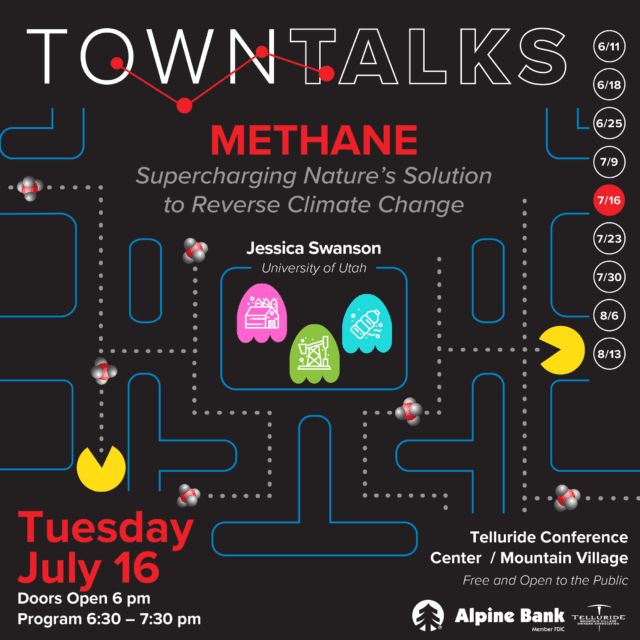
09 Jul Telluride Science Town Talks: “Methane, Supercharging Nature’s Solution to Reverse Climate Change,” 7/16!
This coming week the 2024 Telluride Science Town Talks series continues with Dr. Jessica Swanson. Her subject is titled “Methane: Supercharging Nature’s Solution to Reverse Climate Change.” The event takes place Tuesday, July 16, 6:30 pm; doors, 6 p.m., at the Telluride Conference Center in Mountain Village.
Town Talks are FREE and open to the public.
Note: Telluride Science is committed to expanding its public outreach programming. This summer, the non-profit is hosting the greatest number of Town Talks held to date, a total of nine. All Town Talks take place the Telluride Conference Center.
Visit telluridescience.org to learn more about Telluride Science and the capital campaign to transform the historic Telluride Depot into the Telluride Science & Innovation Center. The venue is soon to be a permanent home for Telluride Science and a global hub of inspired knowledge exchange and development where great minds get to solve great challenges. The public is welcome to the venue’s official opening on Saturday, July 20.
The 2024 Telluride Science Town Talks series is being presented by Alpine Bank with additional support from the Telluride Mountain Village Owner’s Association.
Go here for more about Telluride Science. (back to 2009).
Go here for more on Town Talks.
Go here for more about the opening of the Telluride Science Innovation Center at the historic Depot.

Since as far back as the 1800s, according to the UN and other online sources, human activities have been the key driver of climate change.
On July 16th Dr. Jessica Swanson, an assistant professor at the University of Utah, will give a Town Talk titled “Methane: Supercharging Nature’s Solution to Reverse Climate Change.” Swanson’s research is all about technologies that reduce the amount of methane already negatively impacting the earth’s surface.The vast impact of carbon dioxide has become well known. However, the effect of methane is just beginning to receive the attention it deserves.
Methane has a shorter lifespan – only around 12 years – than CO2, yet it warms the Earth 80 times more than CO2 per gram over a 20-year period (per Dr. Swanson).
Some labs are developing solutions that will decrease methane emissions. One example is Lumen Bioscience, whose work is focused on reducing methane formed in the gut of cattle. Meanwhile, other research entities like the Swanson Group are working to eliminate methane currently being emitted into our atmosphere.
Specifically, the Swanson Group is working on developing methane munchers – highly effective methane-eating bacteria called methanotrophs. These methanotrophs are naturally occurring at high concentrations of methane, breaking down that gas into carbon dioxide and organic compounds. The main barrier to implementing the technology is its efficiency at low methane concentrations.
Dr. Swanson’s lab is working on improving the efficiency of methanotrophs that can be ultilized in bioreactors to counteract the impact of large-scale methane releases. The end goal is to place these enhanced bioreactors in the field in areas of elevated methane levels such as landfills, oil and gas wells, and coal mines.
Dr. Jessica Swanson, more:

Dr. Jessica Swanson, courtesy, Telluride Science.
Dr. Jessica Swanson has always been closely tied to the sciences. She grew up in Los Alamos, New Mexico, where her dad worked at the Los Alamos Lab.
Swanson first became aware of impending environmental changes in middle school. As an undergraduate she went on to study biophysics at the University of California Davis and later earned a PhD in Physical Chemistry from the University of California San Diego.
Swanson began her research career in biophysics, but became sharply focused on mitigating global warming about three years ago.
Today, through the Swanson Group, she integrates biophysics with bioengineering in the hopes of finding climate solutions that could help save our planet.


Sorry, the comment form is closed at this time.